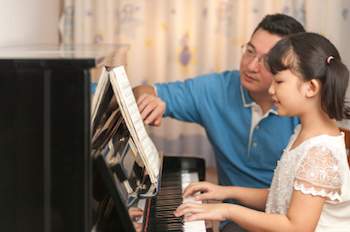The big day is fast approaching. The moment you’ve waited for is finally here. And you know you have to be on top of your game; the best you’ve ever been in order to come out on top.
No, I’m not talking about the World Cup or the Superbowl. Its your moment to shine as you showcase your piano playing talents in front of an audience. No matter how large or small of a group you perform in front of, it can be nerveracking, especially if you aren’t comfortable with your performance. Yet the best way to be prepared is to know the music inside and out – practice will ensure you’ve achieved all you can.
But just like there’s an art form to perfect practice for an athlete, there’s also a routing for perfect practice for a piano player. Have you put these ideas into your practice routine?
Commitment
The key to improving your skills as a piano player is to routinely practice without letting other things get in the way. Small bursts every day will benefit you far more than spending long periods of time one day of the week. Build it into your schedule and stick with it, no matter what.
Stay Organized
Keep your space organized and free of noise and disruption. Leave your phone in another room. Group your practice into sections – focus on scales, technical work, sight reading, specific sections of music, etc. Keep a log of how well you do each day, and try and stick with the same routine every day.
Set Goals
If you will be playing at a music festival on a certain date, your goal becomes easy to see. Yet if you don’t have specifics lined up, goals can be harder to stick with. Goals give us motivation and drive to move forward. You can create short term goals – what you want to accomplish in a session. And you can create long term goals – perfecting certain songs by an end date. Make sure you stick with your time periods and reward yourself with your accomplishments.
Spend Time On Problem Areas
As songs become more difficult and complex, you’ll have parts that come and easy, and parts … well, not so much. When you sit down to practice, it doesn’t mean you have to start at the beginning and work your way through the song in its completion over and over again. Instead, mark with a pencil those areas that are giving you trouble. Start there and work through your difficulties. Its much easier to put your focus on a few lines than an entire piece. As you feel more comfortable with the line, then play the entire song and see how well you do at fitting trouble spots in. Continue in this manner until you’re comfortable playing the entire piece.
Practice With Full Concentration
Its hard to do anything the right way if several other things are going through your mind. If you have things that require your immediate attention – taking something out of the oven for instance – complete that task before you sit down to practice. Five minutes of concentrated practice is far more effective than spending thirty minutes of up and down practice. Because of the different skills it takes to fully engage in practicing, having an active mind will allow you to full connect with the music, and help you become better each day.
You Don’t Need A Piano To Study
Piano playing is a skill you can work on even when you’re not sitting down in front of one. When was the last time you took in the symphony? Head out to a concert and listen for each note. How does the music come together? Piano practice makes you more aware of the different parts of music; by tuning in to how music is created, you can improve your own piano playing ability. You can also analyze music you are currently practicing by reviewing each line, seeing it in your mind, even humming it again and again.

